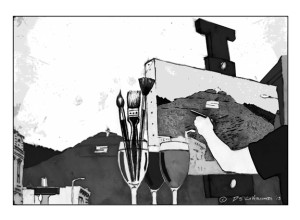By Martha Quillen
How can you tell when things are going fairly well in America? I’m not sure you can.
In the U.S., unemployment is down and our economy has improved. At this point, our banks have made it halfway through 2013 without crashing, and the stock market has reached unprecedented highs.
But is everybody celebrating? Hardly.
Nope, we’re waiting with baited breath for the new disaster, which popular sentiment predicts is bound to come – given what a mess we’ve made of things.
Yet many of the most contentious political issues today were around in the 1930s, 20s, and even earlier. During the last decade, Americans brought some truly antique controversies out of retirement, including birth control, women’s reproductive rights, homosexuality, school prayer, and that grand old chestnut from yesteryear: whether Darwinian theory and/or creationism should be taught in America’s public schools.
Talk about resurrecting dead horses.
It’s not that those issues aren’t important, though. Clearly they are or they wouldn’t keep coming back. What is more germane is whether such matters should be entrusted to state or federal legislators.
Is it better to have many children? Or just one? Or two? Or none? Is premarital sex acceptable? Is abortion warranted when a pregnancy is unwanted? Or in cases of rape or incest? Or when the fetus is deformed? Or unviable?
Your answers will depend upon your religious and philosophical beliefs, which in my mind puts them outside the purview of Congress. But more to the point, does anyone really believe that Congress should make such decisions for them?
Of course not. But the people who champion this sort of legislation want to make those decisions for us. These modern new-style missionaries believe they can fix us – with the help of our federal and state governments.
But history suggests otherwise. Over the centuries, governments have launched countless cultural improvement plans that have involved innumerable crusades, crackdowns, reformations, revolutions, inquisitions and prohibitions, but to little avail. Cruelty, immorality, hatred, murder, greed, fraud and thievery persist – especially in the illustrious chambers of governance.
Clearly, governments are incapable of imposing good values or behavior. And our government, in particular, is not constitutionally designed to make people’s religious or personal decisions for them. So let the pope demand restraint. Let the Chinese impose abortions; and let concerned citizens offer caring alternatives to abortion. Our government should stay out of it – because there is only so much that governments can handle.
Exactly what it is that our current U.S. Congress can handle remains to be seen. But it would be short-sighted to place all of the blame for recent congressional fiascoes on Congress. In a democratic society, the citizens have to accept some responsibility for their government, even if their primary fault is merely apathy.
But I’m beginning to think that the citizenry’s greatest fault may not be apathy, or inaction, or ignorance of the issues.
Maybe it’s age. The percentage of the U.S. population over 60 was almost 20 percent in 2010, compared with 6.4 percent in 1900, and it is expected to be more than 25 percent by 2040. That’s a lot of old people for a society to support.
But don’t despair. Due to immigration, our nation is considerably less gray than Europe and Russia, and according to experts, it has far rosier financial prospects.
However, the gravest challenges faced by aging societies may be psychological rather than economic.
Here in Salida, our governmental problems are relatively minor. We are not dealing with war, famine or tornadoes. Currently, our biggest issues are an overabundance of deer and a host of expensive community projects that worry a lot of residents, particularly seniors whose incomes are unlikely to rise as costs go up.
For the elderly, economic and health care issues are especially problematic. I’m getting old, and it’s scary. Most days I feel fine, but sometimes my joints remind me that I’m changing, and then I start fretting about my memory, and worrying about how I’m going to handle that new computer upgrade. And if the economy crumbles again, no company is going to want to retrain me ….
But then I tell myself that I’m all right, because I am.
When it comes to politics, senior citizens have a unique perspective, not just because of their needs, but also due to their position in society. Contrary to popular wisdom, we aren’t just interested in Medicare, Social Security and handicapped accessibility. Even though we won’t be around in thirty or forty years, we tend to think we know a thing or two about life. And one of the things we bring to the table is the past.
My grandparents’ generation had radio. My parents’ generation was mesmerized by Hollywood. My generation was influenced by television, and my children’s generation grew up with Sesame Street and video games. Now kids can get movies, video games, music and reading materials, Google, texting, filming and photo ops on one small handheld instrument. Modern kids can be connected to the rest of the world 24/7, indoors and outdoors.
Today, people multitask, and cars talk, and everyone old and young seems to enjoy standing in your way in the aisles at Safeway and Walmart while talking loudly to people far away. It’s enough to make an old person want to go screaming into the hills.
So it’s little wonder that so many people support old-fashioned values and old-time religion and the way things used to be.
But our recent sentimental journeys into yesteryear haven’t been inspiring community box socials reminiscent of 1910. Instead, infamous old political ploys are making a come-back. Racism is staging a repeat performance. Candidates are stereotyping minorities as “entitled” and “dependent,” and more and more states are adopting voter suppression tactics, anti-union stances, and anti-collective-bargaining measures.
Tea Partyers want to “Take Back America.” NRA members want to take back their guns. Health care patients want their old doctors back. And environmentalists want their heirloom seeds and dark skies and pure water and green spaces and clean air back.
What happened to America? And where did all of those guns and doctors go?
I have no idea. Maybe some of those wily immigrants stole them and took them back to Mexico. Or maybe they are still here, but people feel as if they’ve lost something because modern life can be so exasperating.
Today there are electronic gadgets everywhere, and they are always changing. Some of this stuff seems to have a shelflife shorter than yogurt’s, which means you have to keep learning about new systems, programs, accessories and websites.
And the quality of modern conveniences is variable. Cell phones distort voices and pick up distracting background noises, which make them painfully irritating for people with hearing problems. Likewise, relying on home computers, live streaming and portable receptors can be maddening when the service is slow and intermittent or it crashes.
I could go on and on about modern provocations: the threat of terrorism; the proliferation of plastics; the over-packaged food; robocalls, airport security; automated phone services (if you need to talk to a human representative, please stay on the line forever ….
Modern life can get discouraging. And yet I think Americans need to cheer up, and recognize that our current situation isn’t dire. There are things we need to work on, but modern life has brought us good things, too: the vast amount of information available at the click of a mouse; the great films you can watch in your living room; medical scans; new trails; online college courses ….
Seniors, in particular, need to reflect upon the positive side of modern American life and focus on what can be done to make it better, because people over 60 are the most reliable voters in the U.S. – and it’s all too easy to destroy something if you believe it’s beyond repair.
Martha Quillen is a baby boomer, which puts her on the young side of old.





Martha-I have always gone by my own theory that the more pennies you find on your morning walk, the better the blue collar section of the economy is reading.
My personal indicator of how well the middle class is getting along economically, is directly related to the amount of too nice to throw away and not quite up to garage sale standards left outside with a clearly marked “free” or “gratis” sign affixed.
Indications that the upper class is doing well, um …the indicator … Oh yeah-they drive pretentious cars I guess.